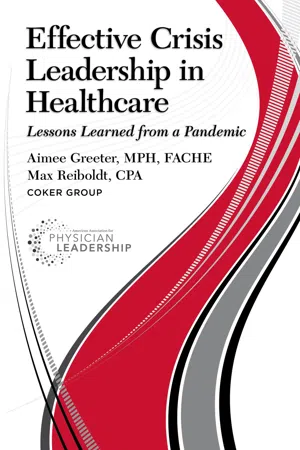
Effective Crisis Leadership in Healthcare
Lessons Learned from a Pandemic
- English
- ePUB (mobile friendly)
- Available on iOS & Android
About This Book
COVID-19 thrust the world into a state of crisis for which no one was adequately prepared, and the fact is that no industry was so hard-hit as healthcare. Although some providers were more equipped than others, without warning all physicians' offices and hospitals were obligated to stay up and running through the deadly pandemic while delivering life-saving care and preventing wide-spread infection.
Effective Crisis Leadership in Healthcare conveys hard-learned tactics, strategies, and advice to enable healthcare leaders to increase their confidence and mental preparedness prior to the next big catastrophe. This book addresses industry-wide problems revealed by COVID-19 like inadequate crisis planning, lack of financial stability, and inexperience with communication and leadership.
How does this book give you an advantage?
Greeter and Reiboldt share key lessons learned from the Pandemic and arm medical practice leaders with actionable information to continue to develop their leadership skills in preparation for future crises.
Here are just some of the topics the authors discuss in detail:
- Definition of Crisis
- Business and Continuation Planning
- Developing a Preparedness Plan
- Actions to Take Before a Disaster
- Communication Techniques During and After the Crisis
- Qualities of Effective Leaders
- Vision of the Future
- Management Principles for Administrative and Physician Leaders
- Minimizing the Potential Impact of a Crisis
- Ongoing Monitoring
- Cybersecurity and Crisis Management
- Third Party Vendors
- Crisis Management Planning Team
- Stress & Tension
- Legal Counsel's Role in a Crisis
- Post-Disaster Checklists
- Organizational Learning and Social Evaluations
- Learning from Our Mistakes
If you're a healthcare provider or administrator, Effective Crisis Leadership in Healthcare will give you the benefit of COVID-19 hindsight and a roadmap to planning for any future catastrophes.
Frequently asked questions
Information
- An unstable or crucial time or state-of-affairs in which a decisive change is impending, especially, one with the distinct possibility of a highly undesirable outcome.
- A situation that has reached a critical phase.
- Sources of uncertainty, disruption, and change.
- Harmful or threatening for organizations and their stakeholders.
- Behavioral phenomena, meaning they are socially constructed by those involved.
- Parts of extensive processes rather than discrete events.
| Figure 1.1. Types of Crises |
| Natural Crisis
|
| Biological Crisis
|
| Technological Crisis
|
Table of contents
- Acknowledgments
- About the Authors
- About Coker Group
- Preface
- Chapter 1
- Chapter 2
- Chapter 3
- Chapter 4
- Chapter 5
- Chapter 6
- Chapter 7
- Chapter 8
- Chapter 9
- Chapter 10
- Chapter 11
- Chapter 12
- Chapter 13
- Chapter 14
- Chapter 15
- Appendix A